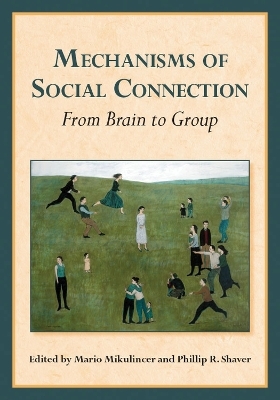
Mechanisms of Social Connection
American Psychological Association (Verlag)
978-1-4338-1415-0 (ISBN)
Social connections contribute to our vitality and sense of meaning and—at times—to our anguish. The mechanisms underlying human connections have long fascinated researchers in the social sciences and, more recently, in neuroscience. Yet there is too little dialogue among these scientists and too little integration of findings.
This book aims to rectify that situation by surveying cutting-edge theory and research on social connections. Chapters explore the formation of social connections at four levels of expression: neurological, developmental, dyadic, and group.
Mario Mikulincer, PhD, is a professor of psychology and dean of the New School of Psychology at the Interdisciplinary Center in Herzliya, Israel. He has published five books and more than 280 scholarly journal articles and book chapters. Dr. Mikulincer's main research interests are attachment theory, terror management theory, personality processes in interpersonal relationships, coping with stress and trauma, grief-related processes, and prosocial motives and behavior. He is a member of the editorial boards of several scientific journals, including the Journal of Personality and Social Psychology, Psychological Inquiry, and Personality and Social Psychology Review, and he has served as associate editor of two journals, the Journal of Personality and Social Psychology and Personal Relationships. Recently, he was elected to serve as chief editor of the Journal of Social and Personal Relationships. He received the EMET Prize in Social Science for his contributions to psychology and the Berscheid-Hatfield Award for Distinguished Mid-Career Achievement from the International Association for Relationship Research. Phillip R. Shaver, PhD, a social and personality psychologist, is Distinguished Professor of Psychology at the University of California, Davis. Before moving there, he served on the faculties of Columbia University, New York University, University of Denver, and State University of New York at Buffalo. He has coauthored and coedited numerous books and has published more than 250 scholarly articles and book chapters. Dr. Shaver's research focuses on attachment, human motivation and emotion, close relationships, personality development, and the effects of meditation on behavior and the brain. He is a member of the editorial boards of Attachment and Human Development, Personal Relationships, the Journal of Personality and Social Psychology, and Emotion, and he has served on grant review panels for the National Institutes of Health and the National Science Foundation. He has been executive officer of the Society of Experimental Social Psychology (SESP) and president of the International Association for Relationship Research (IARR). He has received a Distinguished Career Award and a Mentoring Award from the IARR, a Scientific Influence Award from SESP, and a Career Contribution award from the Society for Personality and Social Psychology.
Contributors
Preface
Introduction
Mario Mikulincer and Phillip R. Shaver
Part I. Brain
Chapter 1: Comparative and Developmental Perspectives on Oxytocin and Vasopressin
Karen L. Bales
Chapter 2: Primary-Process Separation-Distress (PANIC/GRIEF) and Reward Eagerness (SEEKING) Processes in the Ancestral Genesis of Depressive Affect and Addictions
Jaak Panksepp, Mark Solms, Thomas E. Schläpfer, and Volker A. Coenen
Chapter 3: Romantic Love, Pair-Bonding, and the Dopaminergic Reward System
Bianca P. Acevedo and Arthur P. Aron
Chapter 4: The Vicarious Brain
Christian Keysers and Valeria Gazzola
Chapter 5: Our Social Baseline: The Role of Social Proximity in Economy of Action
James A. Coan, Casey L. Brown, and Lane Beckes
Chapter 6:Emotion, Morality, and the Developing Brain
Jean Decety and Lauren H. Howard
Part II. Infancy and Development
Chapter 7: Child–Parent Attachment and Response to Threat: A Move From the Level of Representation
Jude Cassidy, Katherine B. Ehrlich, and Laura J. Sherman
Chapter 8: Synchrony and the Neurobiological Basis of Social Affiliation
Ruth Feldman
Chapter 9: Gaze Following: A Mechanism for Building Social Connections Between Infants and Adults
Rechele Brooks and Andrew N. Meltzoff
Chapter 10: Beyond Words: Parental Embodied Mentalizing and the Parent–Infant Dance
Dana Shai and Peter Fonagy
Chapter 11: Parental Insightfulness and Child–Parent Emotion Dialogues: Their Importance for Children's Development
David Oppenheim and Nina Koren-Karie
Chapter 12: The Impact of Early Interpersonal Experience on Adult Romantic Relationship Functioning
Jeffry A. Simpson, W. Andrew Collins, Jessica E. Salvatore, and Sooyeon Sung
Part III. Adult Close Relationships
Chapter 13: Risk Regulation in Close Relationships
Justin V. Cavallo, Sandra L. Murray, and John G. Holmes
Chapter 14: Responsiveness: Affective Interdependence in Close Relationships
Harry T. Reis
Chapter 15: Attachment Bonds in Romantic Relationships
Phillip R. Shaver and Mario Mikulincer
Chapter 16: A Theoretical Perspective on the Importance of Social Connections for Thriving
Brooke C. Feeney and Nancy L. Collins
Chapter 17: Sexy Building Blocks: The Contribution of the Sexual System to Attachment Formation and Maintenance
Gurit E. Birnbaum
Part IV. Group
Chapter 18: Evolution of the Social Brain: Psychological Adaptations for Group Living
Mark van Vugt and Tatsuya Kameda
Chapter 19: Social Defense Theory: How a Mixture of Personality Traits in Group Contexts May Promote Our Survival
Tsachi Ein-Dor
Chapter 20: It's All in the Mind: How Social Identification Processes Affect Neurobiological Responses
Naomi Ellemers, Félice van Nunspeet, and Daan Scheepers
Chapter 21: Oxytocinergic Circuitry Motivates Group Loyalty
Carsten K. W. De Dreu
Index
About the Editors
| Reihe/Serie | Herzliya Series on Personality and Social Psychology |
|---|---|
| Verlagsort | Washington DC |
| Sprache | englisch |
| Maße | 178 x 254 mm |
| Themenwelt | Geisteswissenschaften ► Psychologie ► Allgemeine Psychologie |
| Geisteswissenschaften ► Psychologie ► Biopsychologie / Neurowissenschaften | |
| Geisteswissenschaften ► Psychologie ► Entwicklungspsychologie | |
| Geisteswissenschaften ► Psychologie ► Sozialpsychologie | |
| Geisteswissenschaften ► Psychologie ► Verhaltenstherapie | |
| Informatik ► Theorie / Studium ► Künstliche Intelligenz / Robotik | |
| Studium ► 1. Studienabschnitt (Vorklinik) ► Histologie / Embryologie | |
| Sozialwissenschaften ► Soziologie ► Allgemeines / Lexika | |
| Sozialwissenschaften ► Soziologie ► Makrosoziologie | |
| ISBN-10 | 1-4338-1415-3 / 1433814153 |
| ISBN-13 | 978-1-4338-1415-0 / 9781433814150 |
| Zustand | Neuware |
| Haben Sie eine Frage zum Produkt? |
aus dem Bereich


